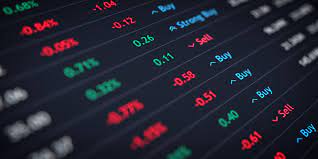Most Asian markets are falling as traders wait for an important speech from Powell.
Most Asian markets were in the red on Monday because of fresh worries over the intentions of the Federal Reserve to increase interest rates in order to battle runaway inflation. The recent comeback from the lows seen in June seems to be running out of fuel.
At a conference in Jackson Hole, Wyoming, where the Federal Reserve Chair Jerome Powell will be speaking, all ears are on him in the hopes that he will provide some insight into the central bank’s future plans.
After two consecutive increases of 75 basis points, a decrease in the rate at which prices are rising and indications that the economy is slowing down have fuelled optimism that authorities would lighten off, and potentially reduce next year. This has helped shares soar internationally.
But in previous weeks, Fed officials, including Powell, have been sounding warnings that the fight against inflation is far from won, especially given the resiliency of the employment market, which has led to a gradual decline in the level of optimism that had been prevalent.
One of the most recent to do so was the head of the Federal Reserve Bank of Richmond, Thomas Barkin, who reaffirmed his dedication to lowering inflation back down to two percent from its four-decade peak of almost nine percent.
On Friday, he said that the policy board will “do whatever it takes to get there.” However, he issued a warning, saying that “there’s a road to keeping inflation under control, but a recession might happen in the process.”
According to Jonathan Millar of Barclays, it is very improbable that Powell would indicate a stop in rate rises this week.
When it comes to transitioning from strong rises to 25 basis points, “It does seem like everything we’ve heard from Powell thus far says there’s quite a high bar for them to cross,” said Powell.
“One thing that they most surely want to express is that they remain very much focused on difficulties with price stability and that they will respond very carefully to any hints of improvements in the inflation statistics,” the author writes.
And National Australia Bank’s Rodrigo Catril added that the Fed chief will likely say that “while we may be close to the end of the beginning of the current tightening cycle, we are still a long way from the end.” Catril said this because the Fed chief is expected to say that “while we may be close to the end of the beginning of the current tightening cycle, we are still a
On Friday, Wall Street’s three major indexes saw losses, and early trading in Asia mirrored those losses.
Hong Kong, Tokyo, Sydney, Seoul, Taipei, Manila and Jakarta dropped.
Shanghai, on the other hand, increased after China’s central bank lowered prime loan rates in an effort to support the world’s second-largest economy. This economy has been severely damaged as a result of lockdowns that have been implemented all over the country as part of the leaders’ strategy to implement zero-Covid.
Additionally, Singapore and Wellington made progress.
The possibility of more interest rate increases in the United States has provided the dollar with an additional lift. As a result, the dollar has strengthened against the yen and is getting closer to the 140 yen threshold than it has been in the previous 24 years.
A stronger dollar was one factor that was helping to keep oil prices low. Another factor that was contributing to the downward pressure on prices was increased speculation about a potential nuclear agreement with Iran, which may assist relieve a supply issue brought on by Russia’s invasion of Ukraine.
“The worldwide balance for the rest of the year is not as tight as many were expecting, with Russian supply holding up well,” said Warren Patterson, of ING Group NV. “The global balance for the rest of the year is not as tight as many were expecting.”
It is possible that it will take Iran many months to raise production back to the levels it had before imposing sanctions in the event that a deal is reached; nevertheless, in the near term, they should still be able to increase exports by depending on storage.


